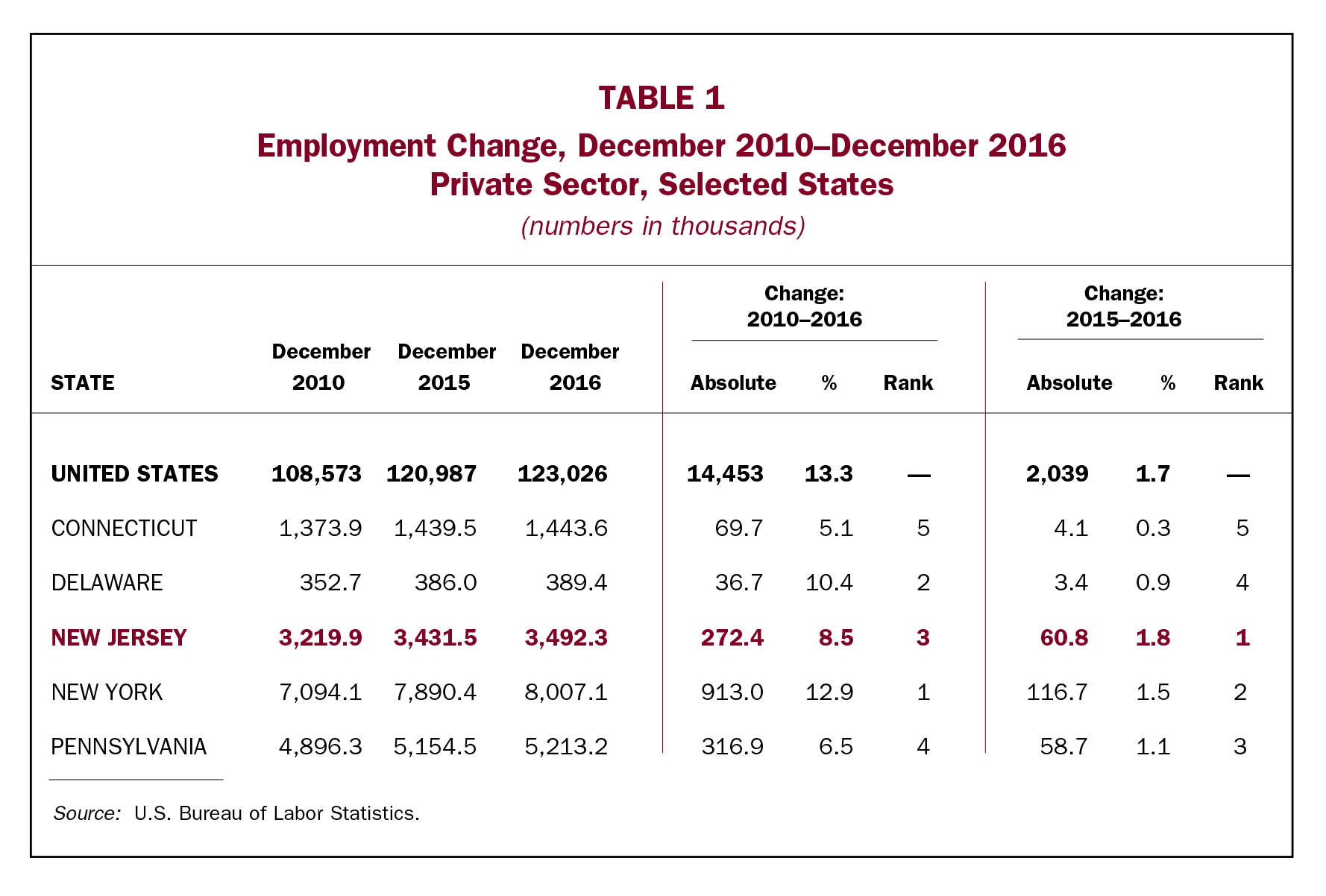
How does New Jersey’s economic performance compare with that of its nearby competitor states? For the longer-term period (2010–2016), New Jersey stands in the middle of the pack. The state’s employment growth rate exceeded that of Pennsylvania and Connecticut, but lagged that of Delaware and New York. None of the five states matched the national growth rate, but New York came close. However, between 2015 and 2016, New Jersey became the frontrunner as its private-sector job growth rate surpassed not only that of runner-up New York but also that of the nation as a whole.
A new Rutgers Regional Report, “New Jersey’s Economic Roller Coaster: From ‘Go-Go’ to ‘Slow-Go,’” examines how the state’s economy has fared since reaching its employment nadir in the immediate aftermath of the Great Recession. The report, authored by James W. Hughes, University Professor and Dean Emeritus of Rutgers University’s Edward J. Bloustein School of Planning and Public Policy and Will Irving, research associate at the Bloustein School, also compares the state’s current economic position to that of the last business cycle peak (2007).
“The current national economic expansion started in June 2009 when the Great Recession of 2007-09 came to an end,” said Hughes. “This month, October 2017, the expansion reached 100 months in length; in March 2017 it had become the third longest expansion in the nation’s history, a status it still holds today. This timing alone makes an analysis of New Jersey’s current economic position highly appropriate.”
December marks the tenth anniversary of the 2007 onset of the Great Recession as well as the simultaneous end – or peak – of the last business-cycle expansion. The authors note that since the last peak New Jersey was enveloped not only by the worst cyclical economic downturn since the Great Depression, but also by longer-term structural demographic and technological shifts and disruptions that have reshaped the economic foundations and underpinnings of the state.
In order to provide multiple reference frameworks for evaluating the state, the report also looks at how New Jersey’s economic performance compares to that of New York City, to that of adjacent neighboring states, and to that of the nation as a whole. It also seeks to answer how the structural transformations of the past ten years have influenced New Jersey’s economy today as compared to 2007.
Hughes and Irving specifically found that:
- Total private-sector employment has grown by 285,100 jobs since the bottom of the recession, indicating that New Jersey has fully recovered all of its recession employment losses. So, substantial progress has been made when benchmarked against the recession employment low point.
- It has taken New Jersey longer to gain full economic traction compared to the nation. The full recovery of the state’s recessionary employment losses lagged behind the nation by approximately two years – 2016 versus 2014.
- In aggregate terms, the state has surpassed the previous employment peak that had been achieved before the onset of the Great Recession; but the progress to date has not been sufficient for New Jersey to advance beyond where it was before the recession began.
- The employment structure of the state has not improved since the last business cycle peak; in particular, the state now has approximately 100,000 fewer jobs paying above-average wages and 135,000 more jobs paying below-average wages.
- Compared to its neighboring states during the 2010 to 2016 period, New Jersey stood “middle of the pack,” growing faster than Pennsylvania and last-place Connecticut, but lagging behind Delaware and frontrunner New York. But in 2016, New Jersey was the five-state frontrunner, surpassing now runner-up New York. Interestingly, Connecticut remained firmly mired in last place, falling even farther behind.
- While this cyclical transformation was taking place, long-term structural changes were well underway. New Jersey’s economy thrived in the late twentieth century era of massive automobile-centric corporate suburbanization, evidenced by a massive 1980’s office building boom spatially concentrated in isolated and insulated suburban campuses and highway corridors. However, these once desirable environments have morphed into post-recession liabilities. Once considered nation leading and state-of-the-art, the state’s disconnected and aging office inventory constitutes less-than-competitive work environments. New Jersey is now saddled with an increasingly obsolete white-collar economic infrastructure as firms and their employees increasingly desire innovation ecosystems – interactive and collaborative workplace settings that are part of walkable, amenity-laden urban-centric locations.
- New York City has become the unchallenged leader of a centralized regional economy. Between 1950 and 2004, which encompassed much of the great era of metropolitan expansion, New Jersey was the regional economic locomotive, adding 2.3 million total jobs. During the same period, New York City added less than 100,000 jobs. But the dynamics changed dramatically between 2004 and 2016, when New York City gained almost 800,000 total jobs, and New Jersey fewer than 100,000 jobs.
- A related fundamental structural shift was the greatest age-structure transformation in American history – the simultaneous maturing of the baby boomers and coming of age of millennials. The suburban-centric baby boom increasingly represents the workforce of the past, while the urban-centric millennial generation is now the largest sector of New Jersey’s workforce. It has also become the prized labor force commodity, eagerly sought after by a corporate America increasingly requiring digital talent.
As the end of the second decade of the century rapidly approaches, New Jersey and its cyclical economic position is completely enveloped by such structural transformations. “As the current expansion continues,” said Hughes, “A fresh round of public policy innovation will be required to ensure the future economic competency of the state and its ability to adapt.”
The Rutgers Regional Report produces formal studies on regional and state economies, demographics, housing markets and other key public policy issues and is used extensively by the state’s planning and public policy communities. The full report is available at https://bloustein.rutgers.edu/reports/rrr/RRR38.pdf
